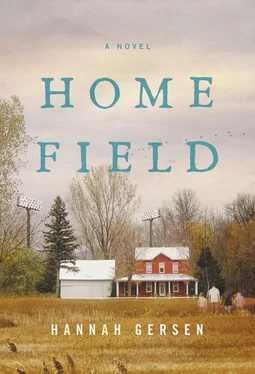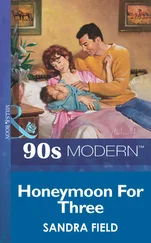After a hot shower, Dean felt almost normal. The boys woke up and he fixed a big breakfast of pancakes and bacon and fruit. Although he had been planning to take them to church, he decided at the last moment to take them to the Antietam Battlefield, which was closer than church, and for Dean, more sacred.
The park was busy with tourists, as well as the runners and cyclists who took advantage of the empty, paved roads that snaked through the quiet battlefield. Dean made the boys read aloud a few of the plaques. He realized it was close to the day of the actual battle. The bright sky, the clear light, the slight hint of autumn on the breeze — all of it was just as it might have been on the morning of what turned out to be the single bloodiest day in American history. Twenty-three thousand men dead in one day. God knew how many horses. Dean couldn’t get his mind around the number. It was a Union win on paper, but there were historians who had devoted their lives to the study of what actually occurred. How it affected the history of the war. The history of the country. Shortly after the battle, President Lincoln had issued the Emancipation Proclamation. It was as if he had to acknowledge what the war was really about.
Driving home, Dean felt calmed. Battlefields gave him perspective. It was their peacefulness that awed him. As if the ground itself had absorbed the violence and confusion of war and made it disappear.
Dean spent the afternoon cleaning. The house needed it, but he was also feeling guilty. About Stephanie. About Laura. About Nicole. He made the boys do the bathrooms before they could play outside, as if they needed to do penance, too.
He cooked dinner again — pork chops with baked apples, one of the few dishes he’d learned from his mother. The boys wanted to watch The Wizard of Oz to celebrate Robbie’s part and Dean let them, even though it was a long movie for a school night. After the scary parts were over and Dorothy was safely on her way down the yellow brick road, Dean excused himself to call Stephanie. No answer. He tried again later, during the poppy field scene, but he got the roommate again. He left a message, giving up for the day. If she didn’t want to talk to him, so be it. She would come around. Still, he felt addled and uncertain.
After he put the boys to bed, he craved bourbon, but instead he pulled out the file of notes and articles about running that he’d gathered from his office. He wanted to plan some real practices for the week. An hour slipped by as he worked on a training strategy and then it was midnight and he was exhausted. For the first time in weeks he went to bed without the aid of booze or late-night television.
“YOU KNOW WHAT’S great about cross-country?” Dean asked the girls. It was Monday afternoon. They didn’t seem quite as forlorn or lacking in athleticism as they had on the first day he met them. And now he had an actual pep talk prepared, the kind he used to give his players. He’d never delivered one to such a small crowd and in such a low voice.
“In cross-country, your past record doesn’t matter. You get a clean slate for every race.” He paused to let this sink in. “You understand what that means? That means the only race that really matters is States. That’s the big dance, right? You get to States, you’ve got yourself a race.”
“But you have to qualify for States,” See-See said.
“ Yes! ” Dean pointed at her, like she’d won a prize. “So the race before States matters, too. Okay. But that’s not for another six weeks. Do you know how many practices we have before that?”
Jessica raised her hand. “Are you counting Fridays?”
“Fridays count,” Dean said. “From here on out, every day counts. Every day is practice. You know how many miles you can run in six weeks? Over a hundred. Easily. In fact, we’ll probably hit a hundred and fifty. And for those of you who choose to run on weekends, you’ll get up to two hundred. But mileage isn’t even what matters most. What matters most is speed. Pacing. Having a kick. I guarantee, if you have a kick in your pocket, you’re going to take down competitors. So let’s get out there and run fast.”
They looked bewildered but obediently jogged to the track, where Dean led them through an interval workout of six timed half miles with thirty-second rest periods in between. By the end of the third half mile, they began to complain.
“I can’t run fast anymore,” Aileen said. “I’m too tired.”
“Good,” Dean told her. “I need to know how fast you can run when you’re tired.”
The following afternoon they joined the boys’ team on the nearby C&O Canal, where Philips liked to bike. They ran as a big group on the flat, shaded towpath, with See-See and Aileen eventually breaking off to run with the slower boys. The miles slipped by without anyone noticing. When they arrived at the canal, the sun sparkled lazily on the Potomac, and when they ended, an hour and a half later, it was a fall evening, the sun low and golden in the sky and the air smelling faintly of campfires.
Dean was in a good mood that night, and when he picked up the phone and it was Laura’s voice on the other end, he felt even better. She said she’d been thinking about him. He said he’d been thinking of her, too. But before he could go on, she interrupted and said that she thought they should keep things professional. And then she told him that Robbie had gotten into trouble again at school. With the aid of a forged note, he had lied to his English teacher and told her that he was needed at the high school for a special choral rehearsal. And then he had walked over to the high school and hung out backstage with the woodshop kids who were helping to design the sets. When his lie was discovered (by the woodshop teacher) and he was returned to the middle school, he had been sent to Laura to confess.
“His teachers want to pull him from the play, but I’ve discouraged that course of action,” Laura said.
“Good. He’s excited about it,” Dean said, surprised to find himself defending the play.
“I’m glad you understand that.”
“He’s my son,” Dean said, testily. He was annoyed by her “professional” tone. A few nights ago they’d shared drinks, confidences, near-kisses.
In the same careful voice, she proposed a meeting, and Dean lost all patience and just said what he had to say to get through the conversation and off the phone. Laura was confusing him. His dream of her, of her turning into Nicole, of Nicole’s hands on his face, of Laura’s breath on his neck, had stayed with him.
Upstairs, he found Robbie and Bryan in Stephanie’s room, watching MTV on her little black-and-white TV, the 1970s model that had once been Dean’s. The TV downstairs was much bigger, but he could see why the boys preferred to hang out in Stephanie’s cozy room, sitting cross-legged on her double bed with its bank of pillows and, above, a moody collage of CD covers and flowers cut from seed catalogs — mostly blue and violet flowers, no pink roses for Stephanie.
“Hi, Daddy,” Bryan said. “Will you tell Robbie to put on Jeopardy! ? He promised I could pick a show at seven thirty.”
“Why don’t you go downstairs and watch it,” Dean said. “I have to talk to your brother anyway.”
“Is this about today?” Robbie said. “Because I want Bry here if you’re going to yell at me.”
“Nobody’s yelling at you.”
“What did you do?” Bryan asked, his bright little face at once eager and nervous.
“Nothing. My teachers just freaked out when I went over to the high school to help out with stuff for the play.”
“That’s not the whole story,” Dean said. “Now will you please go downstairs, Bryan?”
“It is the whole story,” Robbie said. “Everyone treats me like I’m psycho.”
Читать дальше












